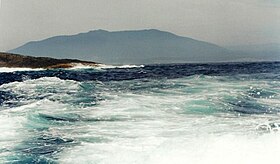Mount Gulaga
| Mount Gulaga | |
|---|---|
| Mount Dromedary | |

Mount Gulaga from Montague Island
|
|
| Highest point | |
| Elevation | 806 m (2,644 ft) |
| Coordinates | 36°18′S 150°02′E / 36.300°S 150.033°ECoordinates: 36°18′S 150°02′E / 36.300°S 150.033°E |
| Geography | |
|
Location in New South Wales
|
|
| Location | South Coast region of New South Wales, Australia |
| Geology | |
| Age of rock | Cretaceous |
| Mountain type | Monzonite igneous extinct volcano |
| Last eruption | 60 million years ago |
Mount Gulaga, also Gulaga, and formerly known as Mount Dromedary, a mountain located in the south coast region of New South Wales, Australia, rises above the village of Central Tilba and is within the Gulaga National Park. At its highest point, it measures 806 metres (2,644 ft) above sea level.
Gulaga is the place of ancestral origin within the mythology of the Yuin people, the Indigenous Australians of the area. Gulaga itself symbolises the mother and provides a basis for Aboriginal spiritual identity; the mountain as well as the surrounding area holds particular significance for Aboriginal women. For the Yuin people it is seen as a place of cultural origin. The mountain is regarded as a symbolic mother-figure providing the basis for the people's spiritual identity.
In May 2006 the Gulaga National Park, incorporating the former Wallaga Lake National Park, was handed back to its traditional Aboriginal owners, the Yuin people, in an historic agreement signed by the NSW Environment Minister and the Yuin people.
The first Europeans to sight the mountain were the crew of Captain Cook's ship, HMS Endeavour on 21 April 1770. Endeavour passed the mountain at a distance of 15 miles (24 km) offshore. Cook named it "Mount Dromedary", as its figure reminded him of the hump of a camel.
In the mid-1800s, Mount Gulaga, then called Mount Dromedary, became a prominent site of gold mining. Rev. W.B. Clarke first found traces of Alluvium gold in Dignams Creek in 1852. Gold mining then became a common activity in the area. A significant amount of gold was found in deposits along streams coming from Mount Gulaga's slopes. Between 1878 and 1920 approximately 603 kilograms (1,329 lb) of gold was found in its slopes. Near the crest of Mount Gulaga, reefs were discovered in 1877 that allowed for gold mineralization. These Pyrite-rich veins which range in size from 15 to 45 centimetres (5.9 to 17.7 in) were mined by the Mount Dromedary Gold Mining Company.
...
Wikipedia

